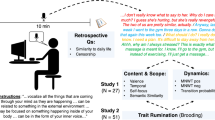Abstract
People appear to behave paradoxically, by persisting in repeated self-change attempts despite previous failures. It is argued, though, that self-change attempts provide some initial rewards even when unsuccessful. Feelings of control and optimism often accompany the early stages of self-modification efforts. In addition, unrealistic expectations concerning the ease, speed, likely degree of change, and presumed benefits of changing may overwhelm the knowledge of one's prior failures. It is thus important to learn to distinguish between potentially feasible and impossible self-change goals in order to avoid overconfidence and false hopes leading to eventual failure and distress.
This is a preview of subscription content, access via your institution
Access options
Subscribe to this journal
Receive 12 print issues and online access
$259.00 per year
only $21.58 per issue
Buy this article
- Purchase on Springer Link
- Instant access to full article PDF
Prices may be subject to local taxes which are calculated during checkout
Similar content being viewed by others
Author information
Authors and Affiliations
Corresponding author
Rights and permissions
About this article
Cite this article
Polivy, J. The false hope syndrome: unrealistic expectations of self-change. Int J Obes 25 (Suppl 1), S80–S84 (2001). https://doi.org/10.1038/sj.ijo.0801705
Issue Date:
DOI: https://doi.org/10.1038/sj.ijo.0801705
Keywords
This article is cited by
-
Peer Support: a Human Factor to Enhance Engagement in Digital Health Behavior Change Interventions
Journal of Technology in Behavioral Science (2019)
-
Éducation thérapeutique et parcours de soins de la personne obèse
Obésité (2014)
-
Spontaan herstel: hoe geloofwaardig en waarschijnlijk is zelfverandering?
Psychopraktijk (2012)
-
Failure to Meet Weight Loss Expectations Does Not Impact Maintenance in Successful Weight Losers**
Obesity (2007)
-
Pretreatment predictors of attrition and successful weight management in women
International Journal of Obesity (2004)



